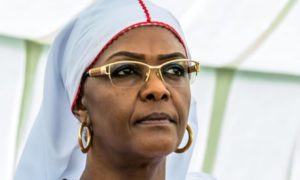The whereabouts of Grace Mugabe, whose political ambitions prompted the military takeover in Zimbabwe on Tuesday, are not entirely clear.
Reports that the first lady had left for Windhoek, the capital of Namibia, were denied by local authorities.
Neither has it been possible to stand up reports placing the 52-year-old second wife of President Robert Mugabe in Botswana, Dubai or Malaysia, where the Mugabe family own property.
It seems most likely that the woman dubbed “Gucci Grace” because of her shopping habit is still holed up in the “Blue House”, the sprawling mansion in the upscale Borrowdale neighbourhood of Harare, where she lives with the president.
In an address to the nation on state TV following the takeover, the army referred to the “family” of Mugabe being “safe” in its custody, as well as the president himself.
“Her future is part of the discussions. The army won’t let her go anywhere until [Mugabe] has stepped down,” said one South Africa-based diplomatic official.
Others point out that it would be unlikely that the former typist, who married the president in 1996, would abandon her husband at such a critical time.
“I would be very surprised if she would leave the side of the president when the negotiations were going on. She’s not that kind of person,” said Priscilla Misihairabwi-Mushonga, an opposition member of parliament.
The whereabouts of the couple’s two sons and daughter are unknown, though the sons, aged 25 and 21, are believed to have been in Johannesburg shortly before the military moved in earlier this week.
Their mother has spent millions of dollars in recent years acquiring property in upscale neighbourhoods of the South African capital. However, her alleged assault on a local model this summer in a luxury apartment rented by her sons has led to legal problems that have made the neighbouring state less attractive as a bolthole.
The military intervention on Tuesday night was in large part aimed at thwarting Grace Mugabe’s bid for power.
Ten days ago, Robert Mugabe sackedhis vice president Emmerson Mnangagwa, a longtime ally, angering senior officers who saw the move as a direct threat to their interests.
Not only did it put Grace Mugabe in pole position to take over from the ageing president, but it was also seen as the first stage of a wider purge of dozens of senior officers and officials.
The battle was not just between personalities. It pitted Grace Mugabe’s G40 faction of young and brash politicians against the older veterans of the liberation wars of the 1970s and 1980s, who were closer to Mnangagwa. Those in the G40 saw the older generation as blocking their route to political power and self-enrichment. Many are now in detention with futures as uncertain as that of the first lady.
Martin Rupiya, an analyst and former general in the Zimbabwean Defence Forces, said the military takeover was aimed at realigning the ruling class. “The G40 did not have roots in a politicised military. It was a creation of the presidency,” Rupiya said.
So too, was the power of the first lady, as she has now learned.



